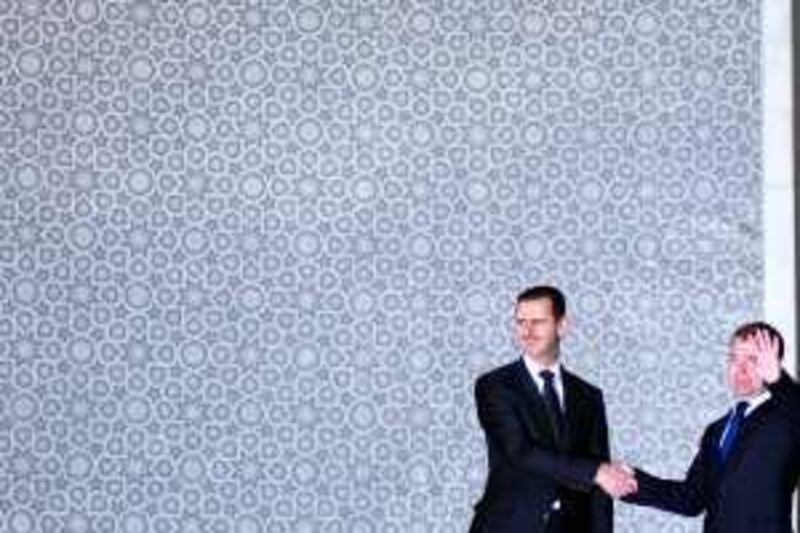DAMASCUS // Syria could scarcely have dreamed of a better outcome to the recent historical visit by the Russian president, Dmitry Medvedev.
In the first leaders' summit between the two nations in almost 100 years, the policy positions of Moscow and Damascus were aligned with uncanny precision. Mr Medvedev criticised US inaction regarding Middle East peace and promised a greater regional role for Moscow, before promptly calling for Hamas, the Palestinian resistance movement, to be included in peace talks; deals were finalised to supply Syria with advanced Russian jet fighters and anti-aircraft defences; economic and business tie-ups were signed.
If that were not enough, the Kremlin chief also opened the door to nuclear co-operation with Syria, which is seeking to build a civilian power station, a project that would certainly require outside sponsorship. The resurrection of Moscow's relationship with Damascus - so strong during the Cold War but substantially weakened after the collapse of the Soviet Union in 1991 - has irritated both Israel and the United States.
Israel remains at war with Syria while Washington, its ally, sees Damascus as a persistent troublemaker that refuses to fall into line. News of the Russian arms sales prompted a rebuke from the Israeli foreign minister, Avigdor Lieberman, as did the call for recognition of Hamas - considered a terrorist group by Israel and the United States, despite winning elections in the Gaza Strip in 2006. A US State Department spokesman, Philip Crowley, expressed his government's dissatisfaction over the potential nuclear deal, noting that Damascus is under investigation by the United Nation's atomic watchdog over an alleged secret nuclear programme.
With the United States still moving at a snail's pace in its own rapprochement with Syria - one heavily burdened by fundamental policy differences - Damascus could be forgiven for thinking that, following the Russia summit, it is successfully outmanoeuvring Washington and holding an increasingly strong hand. Last month Syria was under pressure from the United States and Israel over alleged Scud missile transfers to Hizbollah, the Lebanese militant movement and, once more, talk of war was in the air. The Obama administration then announced renewed economic sanctions against Syria, justifying it on the grounds that Damascus was seeking to acquire weapons of mass destruction and supporting "terrorists".
Syria was, yet again, being pushed into a corner. Russia then stepped in, however, and helped it find a convenient exit. Although the United States had issued warnings about missile transfers and continued its efforts to suffocate Syria's reforming economy, a cheerful Mr Medvedev offered Damascus new Russian weapons, business opportunities and Moscow's help in making Syria a nuclear nation. The US remains the single most influential actor on the regional stage but, with each new diplomatic opening it crafts, Damascus finds itself with a little more breathing space, a little more money and a little more time. And, with Russia now on side, it has a powerful international ally capable of helping it punch above its weight.
Russia is a member of the Quartet for Middle East peace, together with the European Union, United Nations and US. In its support for Israel, it is Washington that increasingly looks at odds with the other members, who are appear to be taking a more impartial line on the Arab/Israeli conflict. Similarly, with the Europeans and Russia looking to deepen trade links with Damascus, it is the US that appears out of step with the economic sanctions that have done little to harm the Syrian elite but which do hamstring market reforms and hinder inquisitive young Syrians in accessing internet technology. Many US companies do not allow access to their sites or downloads from Syria.
Syria counts Turkey and Iran among its close allies, and continues to open business links across the region and wider world. While still facing serious problems, including severe economic difficulties and an ailing domestic political reform programme, Damascus feels increasingly confident in its abilities to stand up to the US and Israel, and to stand against their regional agenda. Now that Russia is once again weighing in as one of its supporters, that sense of confidence has an even stronger foundation.
psands@thenational.ae





